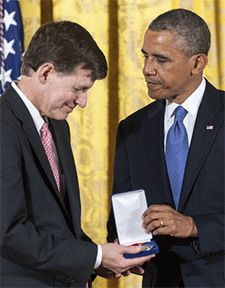By Caroline Hamp
In the East Room of the White House, President Obama graciously presented twelve men and women with National Humanities Medals earlier this year. Phi Beta Kappa is pleased to note that William G. Bowen, a member of the Society since 1954, was among the honorees.
The first National Humanities Medals were awarded in 1997 and each year a maximum of twelve recipients are chosen. The selection process begins with nomination and is completed when the President, after deliberating with the National Endowment for the Humanities (NEH), selects the winners. According to the NEH, the award “honors individuals or groups whose work has deepened the nation’s understanding of the humanities, broadened our citizens’ engagement with the humanities, or helped preserve and expand Americans’ access to important resources in the humanities.”
William G. Bowen’s far-reaching accomplishments certainly deserve the attention of President Obama, NEH, and the world at large. He has been involved in the advancement of humanities since he arrived at Denison University for undergraduate study. While at Denison, Bowen was inducted into Phi Beta Kappa in 1954 and graduated a year later in 1955. Only three years after graduation, in 1958, he earned his Ph.D. at Princeton University. Immediately upon completing the Ph.D. program, Bowen joined the Princeton faculty, specializing in labor economics and later becoming a full professor in 1965. Two years later, his job description grew once again to include the provost of the university. Then, in 1972, Bowen became President of Princeton University.
After sixteen successful years as Princeton’s President, Bowen left to assume the presidency of the Andrew W. Mellon Foundation, a private foundation that gives grants to five core program areas, including higher education and scholarly communications and information technology. His desire to enhance information technology is also apparent in his involvement with JSTOR, ARTstor, Ithaka, and (formerly) University Corporation for Advanced Internet Development. He has helped transform digital learning and communication within the scholarly world.
He quickly made his way to the top of the academic ladder, and throughout his ascent, he produced an impressive array of writing. The combination of a methodical economist’s mind and a thirst to improve humanities allowed Bowen to bring about social awareness. His numerous books pursued controversial subjects, primarily in higher education: from affirmative action to college athletics to technology in academia. Published in 2001 and co-authored by Derek Bok, The Shape of the River: Long-Term Consequences of Considering Race in College and University Admissions received the Grawemeyer Award for its “unparalleled contribution to informing the debate regarding race-sensitive admissions policies.”
The book, along with many others written by Bowen, caught the attention of institutions everywhere. Higher education was, and still is, being changed by Bowen’s logic, data, and credible writing. His works are not simply theoretical; he is writing with a purpose. The admissions office at Washington and Lee University, a small liberal arts university in Lexington, Virginia, often reads Bowen’s works in order to initiate discussion on controversial subjects; this year, they read part two of the Tanner Lectures, originally spoken at Stanford University in October 2012, “The ‘Cost Disease’ in Higher Education: Is Technology the Answer?”
President of Washington and Lee Kenneth Ruscio says of Bowen, “He helps frame the way these issues [the economics of higher education, affirmative action, college athletics, and technology] are discussed. He has a knack for analyzing a problem and offering a solution. His impact is really in raising issues and improving the quality of discussion.”
Bowen has influenced the humanities on an individual, local, and national level. His dedication to higher education and the humanities is apparent in his past positions, recent writings, and current character. Congratulations to a 1954 Phi Beta Kappa member, whose dedication and intellect has duly led him to earn a 2012 National Humanities Medal.
Caroline Hamp is a junior at Washington and Lee University, majoring in English and Religion. In addition to The Key Reporter, she also writes for her university newspaper, the Ring-Tum Phi. Washington and Lee University is home to the Gamma of Virginia Chapter of Phi Beta Kappa.




